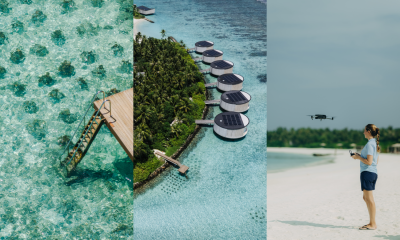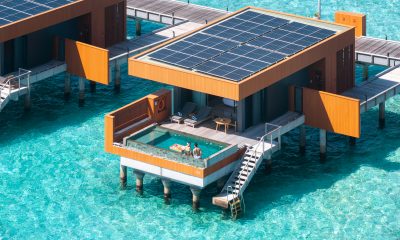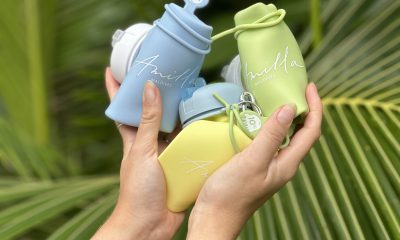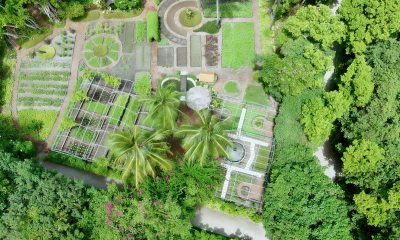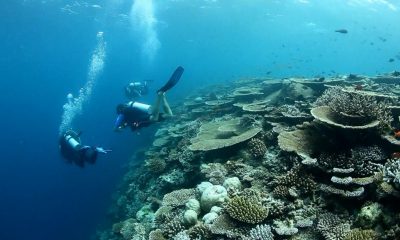Insiders
Afrah Ismail, Co-Founder of Zero Waste Maldives, shares thoughts and learnings from visit to Sri Lanka

Afrah Ismail, Co-Founder of Zero Waste Maldives, visited Sri Lanka to witness first-hand the plastics collection and recycling infrastructure and management. During the visit he gained actionable intelligence on the local perspectives held on plastic pollution, sustainability, and Extended Producer Responsibility. Mr. Ismail visited many recycling organisations and facilities and met with Government Representatives and Members of the Ceylon Chamber of Commerce and shares insights from his visit.

How was your visit to Sri Lanka and what did it entail?
The visit to Sri Lanka was illuminating. I was especially attracted to the views on plastic pollution and the work being done to reduce single use plastic pollution amidst the mounting pressure globally to stop single use plastic. This trip was very insightful, especially regarding the work that Adelphi and Zero Waste Maldives is doing in setting up the extended producer responsibility scheme for the Maldives. Adelphi is a leading independent European think-and-do-tank for climate, environment, and development. They aim to support the Maldivian Government in developing an ERP scheme that focuses on the internalisation of environmental costs and incentives for innovative practices. We have always been interested in cross-border collaboration with neighbouring countries and this trip presented itself as a very good opportunity to meet potential partners for future collaborations and knowledge sharing.
Can you tell me about yourself and about Zero Waste Maldives and some of the key projects implemented over the years?
Zero Waste Maldives is a civil society organisation that works primarily on Waste Management and Climate Change related Issues in the Maldives. Our main goal is to get the Maldives government on board with the Circular Economy agenda, which entails markets that provide incentives for reusing products, rather than scrapping them and extracting new resources. In a Circular Economy, all forms of waste including plastics, garments, scrap metal and obsolete electronics are reintroduced to the economy or used more efficiently. We collaborate closely with both the public and private sectors to ensure that waste reduction and circularity are considered in key government policies. The main work that we are doing is creating the Extended Producer Responsibility Framework for the Government of the Maldives which will be the backbone of the circular economy in the Maldives. We also work closely with UN agencies and the private sector to implement smaller projects that are targeted towards island communities.
Sustainability has become a very important topic amongst governments, companies, and the public. Do you feel that everyone in general has the right understanding about Sustainability?
Not entirely. The term has lost its true meaning in recent years due to its overuse, particularly as a marketing gimmick. Sustainability can mean a variety of things depending on the situation, but from an environmental aspect, I consider circularity to be synonymous with sustainability. Ensuring that a product produced can be reused again in the market in its original intended purpose. Plastics have always been a major point of conversation when it comes to waste and sustainability.
There has been a major misunderstanding of PET. What do you think has been the reason for people to misunderstand PET?
The most noticeable type of litter and waste is PET. Because it is one of the most cost-effective, widely available, and durable materials, it quickly accumulates if the right infrastructure is not in place to ensure that it reaches its designated end-of-life destination, whether it is landfilled, burned or recycled into other products. PET being mismanaged at its current end of life is the major reason that it is misunderstood.

The global plastic recycling industry is estimated to reach approximately $45 Billion by the year 2026. It supports the environment and has a great potential towards nurturing economies and livelihoods. Why do you feel that people haven’t understood its potential?
We do not have a robust manufacturing sector in the Maldives and the actors in that sector are primarily interested in placing things on the market, not ensuring circularity or profiting from recycling. There is clearly a lot of value to be extracted but the proper actor has yet to emerge with the necessary investments to demonstrate that it can be done. Sometimes action speaks louder than words, like in the case of the Maldives, where someone must step in and demonstrate that things can be done differently and that they CAN be done. With more and more countries putting up green walls on recyclables such as Plastics it is an important sector for local actors to invest into.
Globally, companies are slowly embracing Extended Producer Responsibility (EPR) over Consumer Social Responsibility, what are your thoughts about the shift?
Extended Producer Responsibility, in my opinion, is the cornerstone policy that governments may use to shift from a linear economy to a circular economy. More work and energy should be invested into putting this policy approach into practice. EPR provides a much-needed platform for collaboration across various industries and governments. We are amid a climate emergency, which necessitates immediate collaboration and cooperation.
Some individuals and companies have understood the potential that PET holds. Eco Spindle is one such organisation that understands the value of PET. You had an exclusive visit to their plant and got to experience the work they do and how they do it first-hand. What are your thoughts on Eco Spindles and their efforts to deal with the waste issues?
I was pleasantly surprised to find out that this level of advanced technology exists this close to home. In the Maldives we have been collecting and shipping single use plastic overseas to countries like India and Taiwan and my first thoughts were why were we not shipping it to Sri Lanka and having that cross-border collaboration with our closest neighbour. Eco Spindles is working hard to find more solutions to plastic pollution, both in terms of production and research and development. It was fascinating to see how the entire material supply chain works, from the Local Collection Agents to the collection stations, MRFs, and transportation to the Eco Spindles recycling facility. The similarities and differences with the Maldives waste management system were eye-opening, especially considering the work we’ve done to develop an EPR plan for the Maldives.

How would you describe your experiences with PET recycling?
In the Maldives, we don’t recycle anything in the country. Almost all the PET that is collected for recycling is exported. Personally, I believe that the country is losing value because raw material gathering is the most expensive and has the worst profit margins. But it makes a lot of sense for the Maldives if we can recycle and develop value-added upcycled materials and goods.
What are your thoughts on the products Eco Spindles and the partner companies have been able to produce?
For me, what makes sense for PET recycling is the upcycled products that these entrepreneurs have been able to create. PET recycling from bottle to bottle presents too many obstacles and risks of contamination for a food contact material, hence the safest solution is to upcycle PET into the items that Eco Spindles and partners are currently producing. It’s critical that the items have a long useful life so that they don’t become a problem down the road. It’s nice to see that these businesses are also considering how to recycle the PET products they create.
Sri Lanka had announced to go to a plastic ban, but they instead implemented an EPR solution, an initiative that has now proven results. What are your comments on Sri Lanka’s decision to choose EPR and discontinue the plastic ban?
Personally, I believe that some plastic products should be prohibited. Especially those that promote a take-make-trash linear economy, which puts a strain on waste management systems and the environment around the world. In Sri Lanka, I believe that the change from ban to EPR on some products has resulted in a favourable mindset shift within the industrial sector, as well as a significant increase in investment in recycling. This boosts both the country’s technical expertise as well as the creation of a new industrial sector that can provide economic value to the country.
It’s also encouraging to note that a variety of stakeholders are trying to improve interception and recycling rates around the country. This will encourage more money to flow into the informal waste management sector, as well as increased participation in collection and recycling efforts around the country.
When governments make policy decisions, the most important stage is to conduct thorough stakeholder consultations and discover the optimal middle ground that benefits all stakeholders. What are your thoughts on Sri Lanka’s existing waste management and collection centre infrastructure?
We were able to see how the Plastic Waste collecting infrastructure is built up, and how it is set up makes a lot of sense. All players at all levels of the process are compensated for their efforts to guarantee that the collected plastic reaches its intended destination, which is a recycling centre. This, in my opinion, is a significant flaw in the Maldives’ current system.
Do you see EPR and PET recycling as a feasible option in the Maldives as well, especially at a time some companies are showing interest in setting up recycling plants?
Yes, a PET recycling factory backed by an EPR scheme would be very successful in the Maldives. Just from the Maldives’ beverage manufacturers, about 3500 tons of PET should be generated each year.
What type of impact would you think a feasible EPR solution would have in your country?
Plastic and packaging waste would be included in the EPR program we are developing for the Maldives, but it might later be expanded to include other recyclables such as aluminium, tin, e-waste, glass, and other materials. Our intention with supporting the government in setting up this policy is to help Maldives transition to a circular economy. We also see the EPR scheme supporting the waste management infrastructure in the Maldives, particularly at the island level, by recognizing the value of recyclables and ensuring that they are collected separately so that they can be recycled in the Maldives.
Do you see room for further knowledge sharing collaborative sessions between both countries?
Yes, we see several areas where we can share our expertise and knowledge, particularly in the field of EPR. We are enthusiastic about sharing what we know and assisting our neighbours with their waste management efforts.
Action
Freediving with tiger sharks: Shark Expedition Fuvahmulah collaborates with marine biologist Andriana Fragola

Shark Expedition Fuvahmulah, renowned for its world-class scuba diving encounters, has announced an exciting expansion: the chance to freedive with tiger sharks in the Maldives’ southernmost atoll.
Fuvahmulah, often hailed as the “Tiger Shark Capital of the World,” is the only place on the planet where year-round encounters with tiger sharks are virtually guaranteed. With more than 280 identified resident tiger sharks, the island has become a bucket-list destination for divers and marine enthusiasts alike.
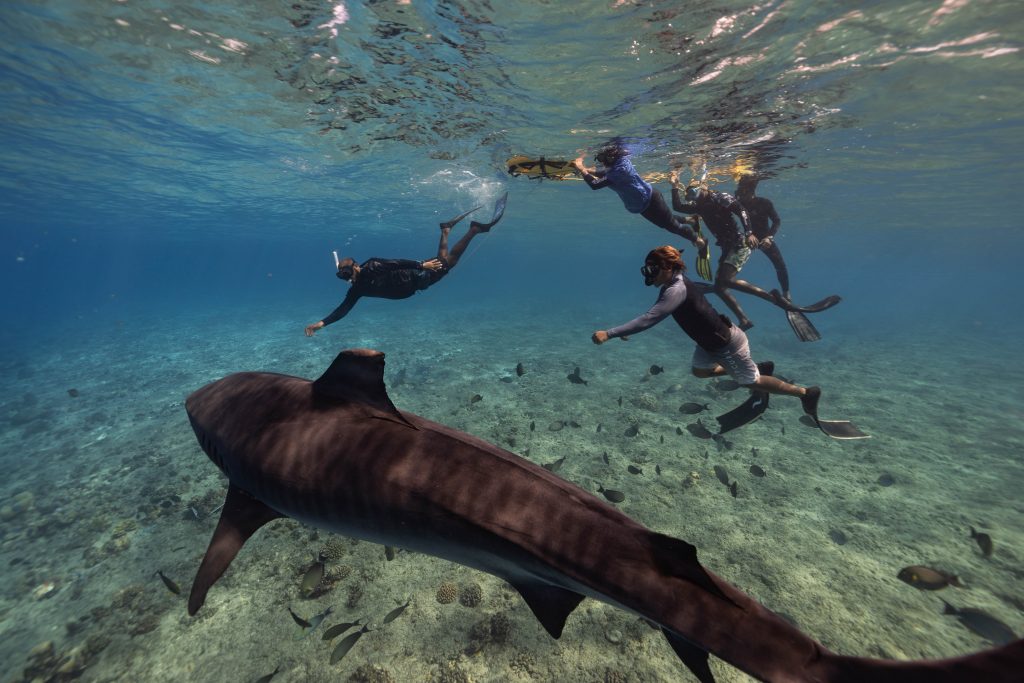
The newly introduced freediving experience offers a unique way to interact with these apex predators. Unlike scuba diving, freediving takes place without bubbles or heavy gear, allowing participants to connect with tiger sharks in a quieter, more natural way. This approach often makes the encounter more comfortable for the sharks and more intimate for the diver.
Guiding these expeditions is Andriana “Andy” Fragola, a marine biologist, shark diver, and conservationist currently based in Hawaii. Andy holds a Master’s Degree in Marine Conservation Biology with a focus on shark microbiology and has dedicated her career to shark research, conservation, and public education. Through her work in media and content creation, she strives to raise awareness about the importance of shark conservation and inspire people to take action to protect marine ecosystems.
“Freediving with tiger sharks is a raw and transformative experience,” says Andy. “Being eye-to-eye with these incredible animals without the barrier of scuba gear allows you to see them for what they truly are—powerful, intelligent, and essential to the health of our oceans.”
Shark Expedition Fuvahmulah ensures that all freediving activities are conducted under strict safety protocols. With experienced professionals like Andy leading the dives, participants can expect both an exhilarating and responsible adventure.
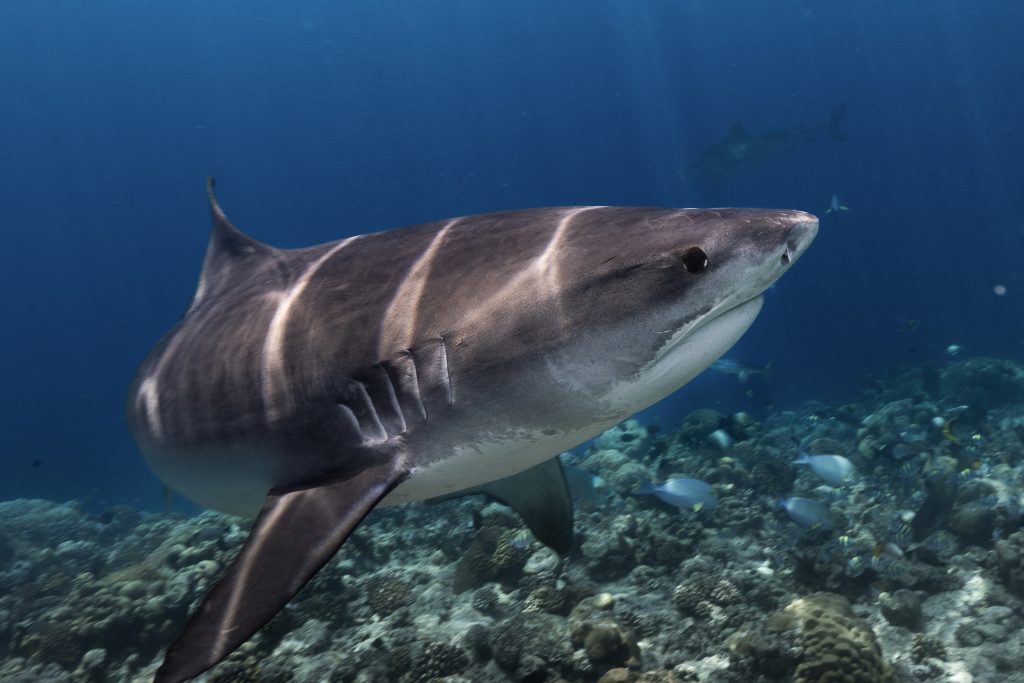
Why this experience stands out:
- Eye-to-eye encounters with tiger sharks in their natural habitat.
- A deeper, more personal connection with marine life.
- Expert-led guidance ensuring safety and conservation awareness.
In addition to freediving, Shark Expedition Fuvahmulah offers a range of packages, including accommodation options, making it easier for adventurers to fully immerse themselves in the island’s extraordinary marine environment.
For bookings and more information:
📧 Email: sales@scuba-expeditions.com
📱 WhatsApp: +960 9894653
🌐 www.scuba-expeditions.com
News
MIC appoints Ali Shakir as Group General Manager

Maldives Inflight Catering Pvt Ltd (MIC) has announced the appointment of Ali Shakir as the Group General Manager. With over 27 years of experience in the hospitality industry, Ali Shakir will now oversee operations for the Maldives Inflight Kitchen, Hulhule Island Hotel, and Madifushi Private Island Maldives.
Ali Shakir, who most recently served as General Manager at OBLU NATURE Helengeli by SENTIDO, played a pivotal role in the resort’s redevelopment and reopening. Prior to that, he joined Atmosphere Core in 2019 as Resort Manager at VARU By Atmosphere, where he was instrumental in the pre-opening of several properties, including OBLU XPERIENCE Ailafushi, OBLU SELECT Lobigili, OZEN RESERVE BOLIFUSHI, and VARU By Atmosphere. His wealth of experience also includes key positions at prestigious resorts such as Angsana Velavaru, Hulhule Island Hotel, and Paradise Island Resort and Spa.
Ali is no stranger to MIC, having spent more than 15 years at Hulhule Island Hotel, where he rose through the ranks to become Executive Assistant Manager before departing in 2019.
Commenting on his new role, Ali Shakir expressed his enthusiasm:
“I am honored to rejoin MIC and lead the operations of these iconic properties. This company has always held a special place in my career, and I am excited to work with the talented team to drive further success and innovation.”
Ibrahim Shareef Mohamed, Managing Director of MIC, welcomed Ali to the leadership team, praising his extensive experience and strategic vision:
“We are delighted to have Ali back at MIC. His proven track record in the hospitality sector, combined with his in-depth knowledge of Hulhule Island Hotel and his previous achievements, makes him the ideal leader to take us forward. I have no doubt that under his leadership, MIC will continue to set benchmarks for excellence.”
Ali Shakir holds a General Managers Program certificate from Cornell University, USA, and a General Hotel Service certification from the Institute of Hotel and Catering Service, Maldives.
MIC is a joint venture between Maldives Airports Company Limited and SATS Ltd, renowned for its inflight catering services to airlines and private jets. Beyond the Maldives Inflight Kitchen, MIC also manages Hulhule Island Hotel, the only airport hotel at Velana International Airport, and the luxurious Madifushi Private Island Maldives in Meemu Atoll.
Tips & Advice
Flying after scuba diving: Essential guidelines for safe travel

Scuba diving in the Maldives offers an unparalleled experience, with its vibrant coral reefs, diverse marine life, and crystal-clear waters. However, one crucial aspect that divers must consider is the timing of their flights after diving. Understanding the recommended waiting periods before flying is essential to ensure safety and prevent decompression sickness. Here’s what you need to know.
Understanding Decompression Sickness
Decompression sickness, also known as “the bends,” occurs when nitrogen bubbles form in the bloodstream and tissues due to rapid changes in pressure. This can happen if a diver ascends too quickly or flies too soon after diving. The reduced cabin pressure in an airplane can exacerbate the formation of these bubbles, leading to serious health risks.

Recommended Waiting Times
The waiting time before flying after scuba diving depends on the type and number of dives completed. Here are the general guidelines:
- Single Dive: If you have completed a single, no-decompression dive, it is recommended to wait at least 12 hours before flying. This allows sufficient time for the body to eliminate excess nitrogen.
- Multiple Dives or Multiple Days of Diving: For divers who have completed multiple dives or have been diving over several days, the recommended waiting period extends to 18 to 24 hours. This longer duration helps ensure that nitrogen levels in the body have decreased to safe levels.
- Dives Requiring Decompression Stops: If your dive profile included decompression stops, it is crucial to wait at least 24 to 48 hours before boarding a flight. Decompression dives involve higher nitrogen absorption, necessitating a longer off-gassing period.
Seaplane and Domestic Flights
Many tourists visiting resorts and other islands in the Maldives travel by seaplane or domestic flights. While these flights generally operate at lower altitudes compared to international flights, the same waiting time guidelines apply. The reason is that even at lower altitudes, the risk of decompression sickness remains significant due to the changes in pressure.
Practical Tips for Divers
- Plan Your Dives and Flights: When planning your diving trip, consider your flight schedule. Ensure that you have ample time between your last dive and your flight to adhere to the recommended waiting periods.
- Stay Hydrated: Proper hydration can aid in the elimination of nitrogen from the body. Drink plenty of water before and after your dives.
- Monitor Your Health: Pay attention to any symptoms of decompression sickness, such as joint pain, dizziness, or difficulty breathing. If you experience any of these symptoms, seek medical attention immediately.
- Use Dive Computers: Modern dive computers can help track your nitrogen levels and provide personalized recommendations for safe flying times based on your dive profile.
Flying after scuba diving requires careful consideration and adherence to safety guidelines to prevent decompression sickness. By following the recommended waiting times and taking necessary precautions, divers can enjoy their underwater adventures in the Maldives and travel safely. Always consult with dive professionals or medical experts if you have any concerns about your health and safety.
-

 Cooking1 week ago
Cooking1 week agoFrom shoreline to hotpot: New dining experiences at Sun Siyam Iru Veli
-
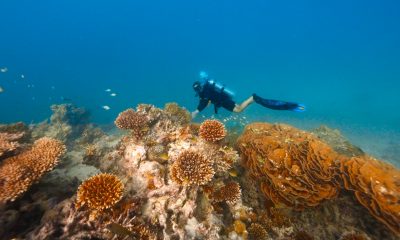
 News1 week ago
News1 week agoVentive Hospitality aligns Maldives portfolio with Green Fins marine sustainability platform
-
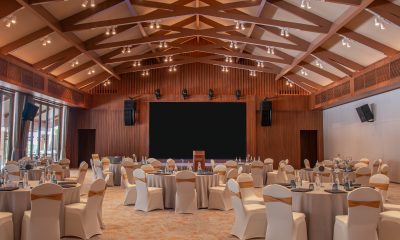
 Business1 week ago
Business1 week agoFeydhoo Hall opens at dusitD2 Feydhoo Maldives as new event space
-
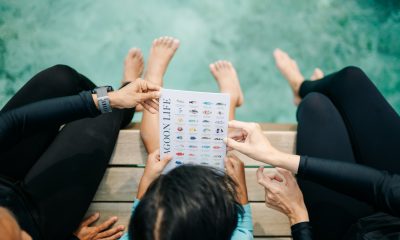
 News1 week ago
News1 week agoThe Ritz-Carlton Maldives, Fari Islands launches conservation programme for environmental observances
-

 Drink1 week ago
Drink1 week agoProvence comes to Maldives with Château Minuty dinner at Milaidhoo Maldives
-
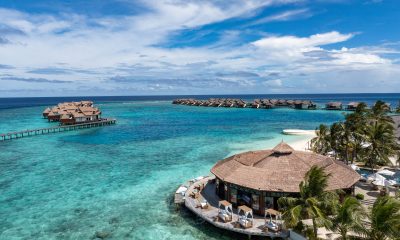
 Awards1 week ago
Awards1 week agoDouble gold win for OZEN RESERVE BOLIFUSHI and OZEN LIFE MAADHOO at Junior Travel Awards
-
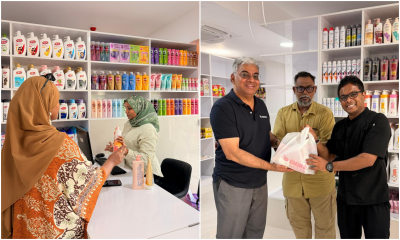
 Business1 week ago
Business1 week agoBBM expands retail presence with new Hulhumalé outlet
-

 Featured1 week ago
Featured1 week agoCity Iftar experience curated at JEN Maldives by Shangri-La



